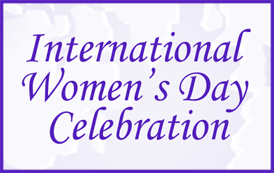 The purpose of the Phoenix celebration of International Women's Day is to raise money for scholarships for women to continue their education, and to eliminate all forms of discrimination against women.
The purpose of the Phoenix celebration of International Women's Day is to raise money for scholarships for women to continue their education, and to eliminate all forms of discrimination against women.
Since 1993, the city of Phoenix and the Phoenix Women's Commission have hosted an event to recognize the resilient spirit of women around the world and raise funds to provide educational scholarships to re-entry women interested in furthering their education.
Background
Since Phoenix's first International Women's Day Celebration, the message advocating human rights for women worldwide has reached tens of thousands of attendees. Our speakers have made us more aware of the global community of women and more appreciative of the freedoms we enjoy in our own country. We have been moved and uplifted by the presentations of internationally recognized educators.
Gloria Steinem was the first keynote speaker. Other speakers have included Bella Abzug, former U.S. Congresswoman from New York (deceased); Deborah Norville, veteran journalist and anchor of the newsmagazine show, Inside Edition; Lisa Ling, reporter and former co-host of ABC Television's The View; Susan L. Taylor, editorial director of Essence magazine; Indra Nooyi, president and CEO of Pepsi Co.; and Martha Beck, best-selling author and life coach.
The annual worldwide celebration of International Women's Day on March 8 commemorates the continuing struggle of women to improve their lives and status.
History
The roots of this special day go back to March 8, 1857, when hundreds of women workers in the garment and textile industry in New York City engaged in a bold and desperate action to improve their lives. They demonstrated against the brutal 12-hour workday/six days-a-week work schedule, low wages and increasingly arduous workloads. They called for equal pay for women and improved working conditions. Their call for social and economic justice was ignored; their protest was harshly dispersed by the police.
These women, however, did not give up. Three years later, they formed their own labor union, again demanding improved working conditions. More than 50 years later in 1908, women from the needles trade industry demonstrated for the same issues, adding to their demands the right for women to vote and laws against child labor. In 1920, German labor leader Clara Zetkin suggested that March 8 be proclaimed International Women's Day in memory of the early struggles by women to improve their lives.
The work is not yet done. Working together, we can realize the goals, dreams and aspirations of women that are deeply rooted in our history.
